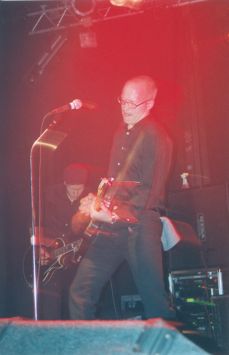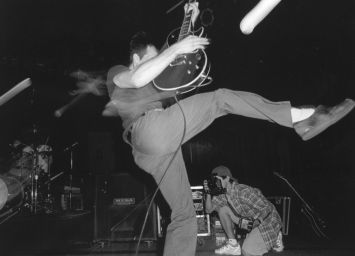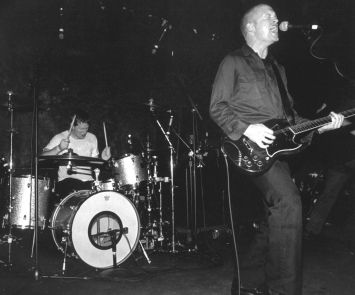

The bottom line is, these guys are hard to find. It took me a month to just get an interview, including several calls to California's Revelation Records, their label, and empty promises to my editor that the story was on the way — as soon as I could talk to a band member.
It isn't that these guys are reclusive, or bound for cutout bin oblivion as so many DIY bands are. When I first heard them at a sweaty, packed Christmas show in a dark church basement venue two years ago, Chris Higdon's voice soared over the cacophony around us like an angelic presence, quieting the crowd and proving this band was due more than 15 minutes of fame. Their new release, False Cathedrals, is a thickly textured, orchestral offering that smacks of brilliance and has been garnering attention from CMJ and Alternative Press. The band itself has been compared to experimental-yet-radio-friendly bands like Fugazi and Radiohead, treading a fine line between hardcore and pop that has brought them new fans from scenes as diverse as metal, pop and punk.

So it isn't artistic reclusiveness or obscurity that makes these guys hard to track down. It's that they're too damned busy.
"We're four weeks into a 6 1/2 week tour," said lead vocalist Chris Higdon in a recent phone interview from California. "We've only got about 4 days off during the whole tour. We're driving constantly — one gig we play at midnight and have to load in to the next gig at 3 p.m. the next day, so we've got a 16-hour drive ahead of us. It's been pretty crazy."
The tour, which covers the US, is not the only one scheduled in the next few months. January 2001 will find the band on their first European tour, where False Cathedrals is already making a huge splash.
"I think it's the first time any of us have been to Europe," said Higdon, "so we're pretty excited. The record sales and press have been phenomenal, and I think they just have different ideas about music over there than we do here in the US. They really help the touring bands out and their hospitality is great—we're really looking forward to it."
Currently, the band is touring 3-4 months out of the year, but plans to push that to 6 months of touring in the next year.
"The band could be self-sufficient if we were touring 9 months out of the year," said Higdon, "so we'd like to get there eventually."
But despite their busy schedule, critical acclaim on 2 continents, record label in California and recording sessions in LA, the band remains based in Louisville.

Maybe the most obvious question for those of us who have often questioned the validity of the music scene here in Louisville compared to other markets is …why?
"Louisville is where I was born, where the band grew up," said Higdon, "and the city has a unique feel. It lacks a lot of the aggravation and negative attention you find in bigger cities, but it isn't the backwoods, either. You don't have to deal with the music industry here like you do in New York or L.A., either. Here you can work on your craft and be honest to what you want to do."
Like most of those who get into the underground music scene, they started young. "I got into the scene when I was about fifteen," Higdon said. "Back then, it seemed like the Louisville scene was a lot bigger, and there were a lot more places to see shows. There was Tewligans, and Uncle Pleasant's, and the Big Grand in New Albany. I remember seeing Endpoint at the Big Grand's Battle of the Bands."
Elliott began in 1995, starting with its original lineup of Ben Lord on drums, John Mobley on bass, and Chris Higdon on guitar and vocals, all of whom had met while in the in the popular Louisville band Falling Forward. Jay Palumbo, former frontman for the Detroit indie band Empathy, joined the band soon after as guitarist.
Influenced by bands like Endpoint and Black Flag, the boys of Elliott started building the musical foundation that would lead them to where they are now. Soon after they formed, they released InTransit, a 7" EP on Initial Records in 1995. After this release, Lord left the band to become a graphic designer in New York and Kevin Ratterman joined the band as drummer.
"When Kevin joined the band, he brought with him a whole new musical outlook, with different sounds and textures. He introduced us to electronica, and really added a whole new depth to the band," said Higdon.
With Ratterman adding sonic power to the band's sound with the use of samples and keyboards, the band went to record part of their new album in L.A. and invited A&R contacts from Revelation Records to hear the band's new sound. The label liked what they heard and signed the band to the label.
"At the time, Revelation was only working with bands from the West and East Coasts, and we were really excited because we were one of the only Midwest bands signed to Revelation at that time," Higdon said.
According to Higdon, their decision to sign with Revelation rather than continue with Initial was not because of a problem with Initial, but because the band felt the working relationship might be better with Revelation.
"I had worked with Initial for a long time, and we were good friends with the people there. It's usually a lot easier to work with people professionally when you start with a business relationship and the friendship grows out of that. With Initial, it would've been the other way around, and rather than risking the friendships we had there, we chose to work with Revelation."
In 1998, the band released U.S. Songs, which was critically acclaimed and started the band on two years of touring and performing throughout the U.S.
In 2000, to bridge the gap between full-length projects, the band released If They Do, a 6-song EP on Initial Records. The band was already working on their next CD and found the perfect venue for the project when Ratterman and Mike Blaine opened InTransit Studios in downtown Louisville. The studio, a renovated pre-Civil War warehouse, became a place for the band to experiment with new sounds and push the envelope on their music.
"There's a great vibe in the studio, and it sparks a lot of creativity," said Higdon.
The result of those months of work was False Cathedrals, released on Revelation. It was the first time the band worked with producer Toby Miller, and it was Miller's first production credit despite his impressive body of work with artists like Fiona Apple, the Wallflowers and Korn.
"We wanted to make things intense and heavy on this record," said Higdon, "but not just with guitars. Toby freed us to explore with different sounds and textures. He let a lot of what had influenced us, what we had grown up with, bleed through the songs."
False Cathedrals features Higdon's lyrics as well, often more poetry than prose and notoriously ambiguous.
"I tried to be less vague on this album, more honest," allowed Higdon, "but still trying to keep as much imagery as possible. Usually I just try to let the music guide where the melody and lyrics will go."
While the band's star is steadily rising, they still have not arrived at the place where the band is their full-time living. When not touring, Ratterman focuses on the studio work (recording for local bands like VHS or Beta, National Acrobat and the Helgeson Story), and Higdon does odd jobs.
"I've done everything from driving a taxi to working at the mall," he said, "whatever pays for food and clothing."
Palumbo and Mobley have both recently left the band, Palumbo to pursue other career opportunities and Mobley to be with his family at the birth of his second daughter. As a result, Benny Clark has joined them on the road for this tour as their guitarist.
As far as the future of the band, while they wouldn't turn away national success, they aren't actively seeking it, either.
"We have the potential to go national, I think," Higdon said, "the possibility of underground bands getting deals with the major labels was proven with grunge, which changed the face of music completely. There are still bands out there pushing the industry to change, but there are so many bands in this genre that haven't had things happen as well, because they're not as clean and polished as people may like. Quicksand and Jawbox are two examples of bands that signed to majors and it didn't work out, and that's very scary. As long as we have a good deal and control artistically, it doesn't matter who we work with, an indie label or the majors."
For now, the band intends to increase its touring schedule, work on new songs at InTransit, and take the good things that come.
"There won't be as long a wait for the next album, I don't think," offered Higdon, "we're writing new stuff and already have an EP single planned. We're gaining a lot of new fans and enjoying that."